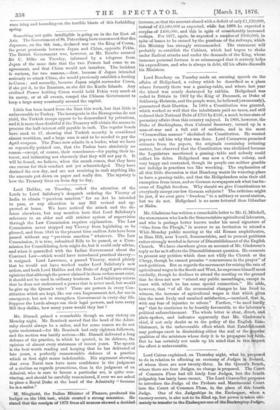Lord Halifax, on Tuesday, called the attention of the Lords
to Lord Salisbury's despatch ordering the Viceroy of India to obtain "previous sanction" for an Act he intended to pass, or any alteration in any Bill revised and ap- proved at home. We have noticed the attack and the de- fence elsewhere, but may mention here that Lord Salisbury's reference to an older and still stricter system of supervision through the Law Commission requires explanation. The Law Commission never stopped any Viceroy from legislating as he pleased, and from 1818 to the present time endless Acts have been passed without any "previous sanction" whatever. The Law Commission, it is true, submitted Bills to be passed, as a Com- mission for Consolidating Acts might do, but it could only advise, and when it quarrelled with the Indian Government about the Contract Law—which would have introduced practical slavery— it resigned. Lord Lawrence, a passed Viceroy, stated plainly that he would not have worked under Lord Salisbury's new orders, and both Lord Halifax and the Duke of Argyll gave strong opinions that although the power claimed in those orders must exist, it should not be used in ordinary business. Lord Salisbury retorts that he does not understand a power that is never used, but would he give up the Queen's veto ? There are powers in every Con- stitution which are kept, like our own Impressment Act, for use in emergency, but not to strengthen Government in every-day life. Suppose the Lords always use their legal powers, and veto every Bill they dislike, how many years would they last ?


































 Previous page
Previous page